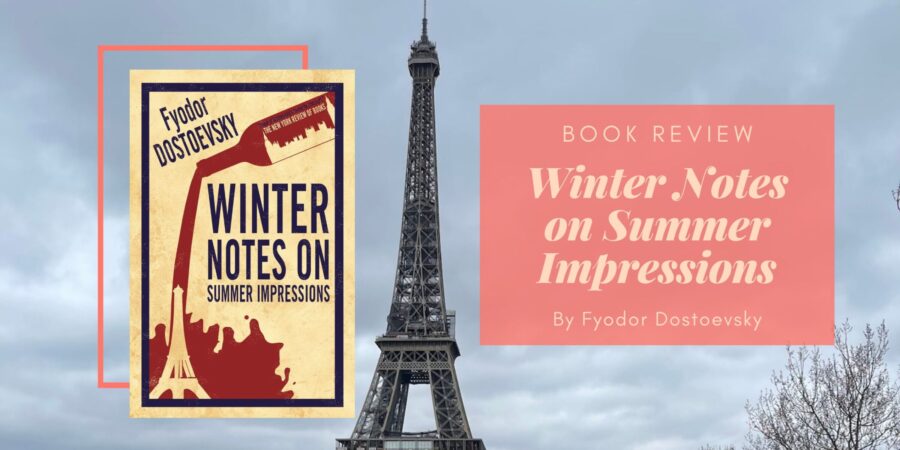I am here with another classic! This time by Dostoevsky, whose last book I read was Notes from Underground and The Double in 2021. What I remember of Dostoevsky in general is that his words have a pessimistic, dark quality about them, which makes them harder for me to read than say, Tolstoy (though I’ve not read Tolstoy in a while either!).
Winter Notes on Summer Impressions, however, is quite different. This is a sort of travel writing piece, if you can count travel writing as including an introduction where Dostoevsky straight up tells the reader that he’s probably going to be inaccurate. In this book, Dostoevsky gives the reader his impressions of mainly Paris/France and a bit of Germany.
In terms of tone, Summer Impressions is a lot lighter than Dostoevsky’s other works. That said, it doesn’t ever reach the lightness of say, champagne, but instead stays biting. There is a sharp edge in these words, and nowhere is it more obvious than in chapter six, where he skewers the bourgeois. As Dostoevsky writes:
“A strange man, this bourgeois: proclaims openly that the acquisition of money is the supreme virtue and human duty and yet dearly loves to play at supremely noble sentiments.”
and in another passage:
“To steal is wicked and mean – that’s what the galleys are for; the bourgeois is ready to forgive a great deal, but he will not forgive stealing even if you and your children should be dying of starvation. But should you steal for virtue’s sake, then oh then, everything is forgiven unto you. It means you want to faire fortune and amass many possession, i.e. perform a natural and human duty.”
This book was published in 1863 but this feels like an extremely pertinent description of society, especially in a hyper-capitalistic yet virtual signalling world.
While I consider chapter six the zenith of the work, it’s closely followed by chapter eight, the final chapter which critiques romantic relationships in France. Dostoevsky continues on the theme of virtue as the supposed motivation (while the actions say something quite different) and criticises the unnaturalness of a society where only lip service is played to chivalry, while people betray the spousal relationship secretly. As long as the forms and rituals are observed, what else is there? A marriage is more of a business relationship than it is a romantic one, and even though it is based on money, affection is always shown on the surface.
I do not agree that this is “a kind of eastern view of women,” that in we say to “Take the money and dupe me as well as you can – give me a counterfeit imitation of love, in other words”, but perhaps his definition of “eastern” and mine are different and I do not have enough information or anymore words that I can quibble with in this one aside.
Overall, this is a short and biting work of Dostoevsky that I find to be quite dissimilar from his other works. Because of that, I don’t think this is suitable for someone who wants to start reading his oeuvre, rather, this is for someone who’s already somewhat familiar with him and wants to read more.
